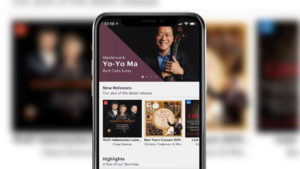 The numbers are in, and they’re looking good.
The numbers are in, and they’re looking good.
For an industry whose identity seems to be based on a constant struggle against popularity, classical music is doing alright. Whilst constantly obsessed with our impending demise, the doom-obsessed factions within classical music might be heartened by the sentiments of author John Steinbeck when he wrote “The theatre is the only institution in the world which has been dying for four thousand years and has never succumbed.”
Recent reports (such as this, this, and this) from 2019 show that if anything, interest in classical music is growing in younger generations. For these new listeners, the democratisation of recorded music through streaming services such as Spotify, Deezer, Pandora, and YouTube Music has undoubtedly had a positive effect, with the last one hundred years of classical music records now available for free without the risk-factor involved of buying an album.
For the uninitiated, getting into classical music is ridiculously tough. An equivalent in pop/rock music might be the decision one day that you would like to finally get into the full catalogue of Bob Dylan, The Rolling Stones, or David Bowie. The issue is, what album do you start with? The first? Or the highest-rated? Thankfully, one no longer needs to go out and purchase an album to start this journey; no longer is there the potential for disappointment and financial loss that a bad purchase offers. The only requirements are a search engine and internet connection.
So, curious members of younger generations are discovering that they can finally dip their toes into the vast pool of recorded classical music and deciding, surprise, that it’s not that awful. According to this article by Classic FM, 15% of university students are now listening to classical music on a somewhat regular basis. Exactly what type of ‘classical music’ is being represented by this definition can be misleading: unfortunately the industry term is so ridiculously broad that it encompasses everything from ancient medieval music, to complex symphonic cycles, opera, film music, and ‘post-classical’ piano music for relaxing.
The last subgenre is potentially cause for concern – and equally, cause for optimism. The rising popularity of musicians such as Nils Frahm, Joep Beving, Olafur Arnalds, and Ludovico Einaudi (the latter having been around for years before the sudden recent upsurge of global fame) shows a deep interest from listeners worldwide in music that allows them to relax and focus.

© Lovely Mobile News
Jennifer Gersten’s fantastic article highlights the risk of taking a four hundred year musical tradition and reducing it to buzzwords such as ‘soothing’, ‘relaxing’, or ‘mellow’. Anyone who has ever sat through a listening of Mahler’s 3rd Symphony or Penderecki’s anything might point out that the emotional range of classical music probably has more potential than allowing some extra focus whilst writing a university essay. Nonetheless, Spotify and YouTube are filled with playlists and hour-long videos with titles such as ‘Classical Music for Studying’ or ‘Relaxing Classical Piano’. And if streaming numbers are any indication, people are definitely tuning in to tune out.
It is clear that the younger generations are growing up in an increasingly connected – and therefore non-stop – world complete with an overdosing of entertainment options in the form of Netflix and Amazon Prime; social media encouraging younger people to constantly be in front of a technological mirror; a relentless torrent of social appraisal that requires a ceaseless stream of updating and image-consciousness that is impossible to maintain.
No wonder they’re looking to relax.
So how can we as a music industry utilise this new (albeit currently focused on relaxing) interest in ‘classical music’? If the classical music industry plays its cards well enough (and let’s be honest, we’ve not got great form in making good business decisions), it will start to offer a genuine answer to the non-stop mentality of the 21st century – without needing to bastardise the product in order to sell it.
For the majority of readers on this website, we are well aware that the experience of going to a concert and watching our ego fade away into oblivion whilst the complexity of music takes over our consciousness is one that offers us a chance to experience something far greater than mere relaxation. As an industry we need to encourage – as opposed to continue demeaning – the new popularity of the ‘post-classical’ musicians mentioned above, and create a bridge that invites audiences to move from the first step of relaxation to the final step of orgasmic spiritual self-realisation (dunno if anyone else gets that from listening to Wagner…).
The marketing of classical music as relaxing is a big problem we need to address: if left unabated, we risk spending the next fifty years in a familiar position of social irrelevance. However, if we play our cards right, we have an excellent opportunity now to give real value to listeners who haven’t discovered us yet: a chance to not just relax, but to take time away from the pressures of the digital world, and experience something intensely human, complex, and satisfying. We need to position ourselves as this outlet, and can do so by allowing our product to speak for itself without resorting to shameless attempts to trick people to attend; by setting fewer restrictive boundaries on audiences, and by encouraging a genuine connection with the music we love.
If we succeed in this endeavour we may finally be able to take a quick vacation from predicting the ultimate demise of classical music, and look forward to being a source of optimism and value for generations to come.




